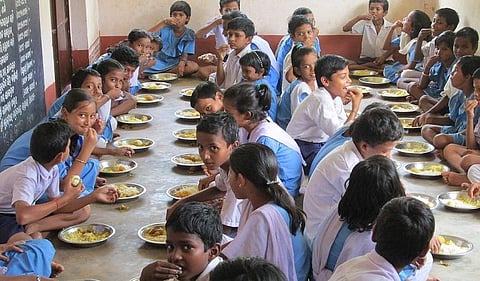

Although the Ministry of Women and Child Development (WCD) in its recent notification released on August 2, Tuesday, clarified that a child's Aadhaar card shall not be mandatory for availing benefits under the Anganwadi Services Scheme and the same can be accessed using the mother's Aadhaar card, food rights activists say that this could still exclude many children from accessing benefits under the said schemes.
"The Anganwadi Services Scheme is open to all eligible beneficiaries on demand, irrespective of caste, religion and income criteria. The only pre-condition is that the beneficiary has to be registered at the nearest Anganwadi Centre with Aadhaar identification," according to the guidelines of the Saksham Anganwadi and Poshan 2 policy (also referred to as Poshan 2.0), as stated in a report by PTI.
This Anganwadi Services Scheme which comes under the Mission Poshan 2.0 of the central government seeks to combat child hunger and malnutrition by providing children up to the age of six, pregnant women and lactating mothers with free nutritious food. The Mission is the government's flagship programme that aims to improve nutritional outcomes for this section of the population. However, an earlier order by the government made the Aadhaar mandatory for availing benefits under the scheme.
This emphasis on Aadhaar came despite a Supreme Court ruling in 2018 that children cannot be denied services for lack of a unique identification number.
However, the government in its most recent notification clarified that a child’s Aadhaar card will no longer be mandatory for availing the benefits under the scheme. But activists say that this still doesn’t solve the problem as the same benefits can be accessed using the mother's Aadhaar card, according to the guidelines.
Concerns and consequences
While appreciating the motive behind the scheme, food rights activists still worry about the implications of it as it doesn’t do away with Aadhaar. “It is still bad that mothers’ Aadhaar card is being used because this linking of Aadhaar card, whether it belongs to the mother or children, weeds out genuine people from the system,” said Swati Narayan, from the Right to Food Campaign. It is a monitoring tool and has no connection with the distribution of benefits, she added. “Because they are not stealing benefits so why should they be the victims of it?” she asked.
In fact, the guidelines also stated that under the Scheme for Adolescent Girls, beneficiaries will require Aadhaar numbers to avail benefits. This will just add another layer of exclusion, said Anjali Bharadwaj, of the National Campaign for People’s Right to Information (NCPRI). She was also one of the signatories of the letter that was addressed by the Right to Food campaign to WCD in June, asking them to rethink this very move. “All those children or mothers who do not have Aadhaar or their card numbers don’t get linked, they will be further be excluded from availing these benefits,” she added. Additionally, she said that the point of Aadhaar is a unique identity. “If one mother has three children and if the same biometric is used for all of them, then how is it unique?” asked.
Especially in the context of the performance of India under the Global Food Hunger Index, which mainly highlights malnutrition of children, there is no rationale behind this move, Bharadwaj said. In fact, India stood at the 101st position in the index in 2021 out of 116 countries, indicating a “serious” level of hunger issues.
Additionally, even when Aadhaar has been linked to the Public Distribution System (PDS) previously, there have been instances of large-scale exclusions, Bharadwaj added. “This is because, in order to have an Aadhaar Based Biometric Authentication (ABBA), the basic necessity is continuous electricity, WiFi facility and these are not available in remote areas,” she added. For no fault of people and those who are marginalised, they are unable to get their food, she said. “We are worried that the same will happen with this scheme as well,” she pointed out.
While addressing that there are multiple issues with Aadhaar including privacy concerns, some activists also pointed out the anomalies of the whole process of linking Aadhaar with other schemes. “This was seen in the maternity benefits scheme as well. A woman's Aadhaar card includes her father's name, but once she is married, it becomes difficult to include the husband’s name. So it is possible now that the children who will be using their mother’s Aadhaar card could face problems because of this,” said Sulakshana Nandi, the National Joint Convenor of Jan Swasthya Abhiyan.
What can be done instead
There is a high level of malnutrition in Anganwadis. A report by The New Indian Express had pointed out that 10 per cent of the children below the age of six years who are enrolled in Anganwadi centres of Karnataka are malnourished. “Especially after the pandemic, its socio-economic impact will continue throughout this generation. So, the government should make things simpler and make such schemes more universal,” Nandi added.
Activists say that if the intention is to ensure that bogus candidates do not end up getting these benefits, then some other measures can be adopted. “Monitoring can be done by those who head the Anganwadis such as the supervisors who are already on a payroll,” said Narayan.
Additionally, to keep track of who gets the entitlement under the scheme, lists can be put up outside Anganwadi centres, said Bharadwaj. “It is important to have a proper grievance redressal mechanism. If someone says they didn’t get their food entitlement, then that complaint should be registered and heard in a time-bound manner and this will eliminate corruption as well,” she added.
